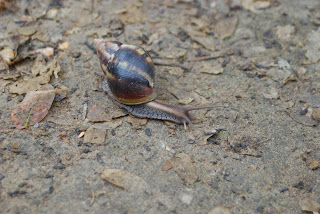IIn all honesty, I’ve been having trouble keeping a diary in Togo. In France, I wrote all the time, everyday. In Togo, I’ve found it a challenge to write about my daily activities; 70 percent of which account for domestic chores—although slightly different from those in the US, not particularly newsworthy.
On the contrary, I’ve occasionally had random two-to-three-minute conversations with Togolese I consider to be worthy of sharing with people Stateside.
For the sake of avoiding any headaches, I’ve translated such conversations from French to English. Naturally.
EVENT NUMBER ONE:
[I’m in the market in search of a few necessities and stroll up to my regular bread vendors.]
Three female bread vendors at once: “Hello my sister! Welcome! How are you? And the trip? And the morning? And work? You want bread? Salty or sweet? 100 cfa, 100 cfa…or 200 cfa, 200 cfa.”
Me: “Hello ladies! How are you? And the night? And the morning? And the kids? And the health? And the bread?!”
I often purchase produce from various vendors, however, I rotate some regulars so they have the opportunity to see my face and get a “gift” from me from time to time.
[I ignore one vendor because I recently purchased bread from her and turn to another on her left. I ask for salty bread and pay the woman 200 cfa.
This did not sit well with the neglected vendor.
Neglected vendor: “What?!?! But I showed you my bread! Oh…you’re not nice.”
Me: “I’m not nice?! I just bought bread from you the other day. Don’t be mad. I have to buy bread from your friend today so she can profit from the white person as well.”
Today’s bread vendor: “Yeah! You ate yesterday. I will eat today. She’s nice! Everyone should have an opportunity to profit from the white person. You’re not the chief of the city!”
[We all laugh together, but the neglected woman is still pissed.]
Me: “Good work ladies. Have a nice day. Madam, over there, I’ll buy bread from you tomorrow. I promise.”
[And the neglected vendor shoots me a smile.]
EVENT NUMBER TWO:
[In a restaurant with my friend Robert.]
Robert: “Your friend in village…she’s like a man.”
He’s of course referring to her short hair, her solidly built physique, her lack of wearing skirts and dresses, and the fact that she smokes.
Me: “She’s tough, for sure, but very much a woman.”
Robert: “I find it strange that she smokes.”
Me: “Oh really, why? A lot of people smoke in Togo. My friend in village doesn’t have a mini market, but people sell cigarettes, tchakpa and sodobe.”
Robert: “Yes, but have you ever seen a Togolese woman smoking a cigarette?”
Whoa.
Me: [With an inquisitive regard] “Okay. You’re right. I’ve seen several female PCVs smoking but never once have I seen a Togolese woman smoke a cigarette. That’s bizarre. Why is that?!”
Robert: “Here, in Togo, women don’t smoke because female smokers are viewed/labeled as bandits.”
Me: “What?! [I laugh out loud.] You’re joking. That’s crazy. Really?”
Robert: “Yes, it’s true. If someone sees a woman smoking, he or she believes this woman takes part in le banditisme (bandit behavior).”
Me: “Wow. Well then. I might just pass that little tidbit to my friends.”
I haven’t yet asked women how they feel about this, but I’ll slip in a question here and there to get some answers. Timing is everything, as is the women I choose to ask.
Until next time, or until A Collection of Random Events: Part Two…







